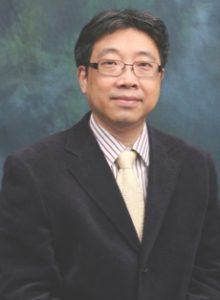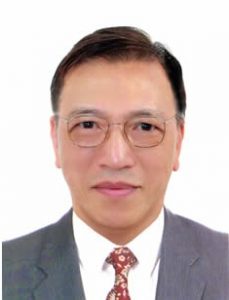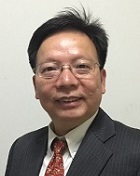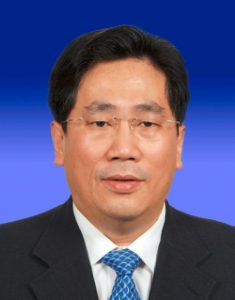All the keynote speakers are sorted by the family name.
Prof. Jian-Nong Cao
 Title: Smart wireless sensing for humans
Title: Smart wireless sensing for humans
Abstract:
The last decade has witnessed the great development of information and communications technology (ICT) related to wireless sensors networks (WSNs), internet-of-things (IoT), and cyber-physical-systems (CPS). However, these applications are more focused on monitoring environment or objects. On the other hand, using smart wireless sensing techniques for humans (SWSH), has attracted more and more attentions in recent years. Monitoring humans has some special challenges due to the mobility of humans and the requirement of sensing in a non-intrusiveness and privacy preserving manner. In this keynote, I will introduce the recent research of SWSH. In SWSH, smart phones have taken an important role and fostered many applications. In addition, different from traditional WSNs, IoT and CPS, the role of wireless in SWSH has extended from purely transmitting data to both sensing and communications. In this speech, from the granularity of the information acquired, I will give the state-of-art applications of SWSH ranging from group detection, localization to activity recognition, breathing monitoring and emotion detection. The future trends and directions in SWSH will also be described.
Biography:
Dr. Cao is currently a chair professor of the Department of Computing at Hong Kong Polytechnic University. His research interests include parallel and distributed computing, wireless and mobile networks, big data and cloud, and pervasive computing. He has co-authored 5 books, co-edited 9 books, and published over 500 papers in major international journals and conference proceedings. He is a fellow of IEEE, a senior member of China Computer Federation, and a member of ACM. He was the Chair of the Technical Committee on Distributed Computing of IEEE Computer Society from 2012-2014. Dr. Cao has served as an associate editor and a member of the editorial boards of many international journals, including ACM Transactions on Sensor Networks, IEEE Transactions on Cloud Computing, IEEE Transactions on Computers, IEEE Transactions on Parallel and Distributed Systems, IEEE Networks, Pervasive and Mobile Computing Journal. He has also served as a chair and member of organizing/program committees for many international conferences, including PERCOM, INFOCOM, ICDCS, RTSS, DSN, SRDS, ICC, GLOBECOM, and WCNC.
Prof. Bob Li
 Title: Intuitive applications of network coding
Title: Intuitive applications of network coding
Abstract:
Network coding (NC) brings a paradigm shift in the data transport mode from the traditional store-and-forward. The fundamental theory of NC is in terms of linear algebra. Linearity makes the hardware/software implementation feasibly fast for practical applications, including wireless communications, redundant storage, P2P content delivery, IC layout, security, optical communications, sensor networks, etc. All these applications are under different contexts. Luckily the Butterfly Network provides an example that is comprehensible to people in all walks of life and, at the same time, is generalizable into elegant mathematics.
The wide applicability has generated interest in multi-disciplinary research among computer science, information/coding theory, matrix theory, networking, operations research, and switching. NC is now one of the most active fields in information technology. Since 2003, the NC literature has grown explosively to about 10,000 papers.
Biography:
Bob Li currently serves as Distinguished University Professor at University of Electronic Science and Technology of China (UESTC). He is the founder of network coding theory, algebraic switching theory, and martingales of patterns. His expertise is in bridging mathematics and engineering. His book “Random Kingdom” in 2017 starts a new model of scientific education.
He received PhD in Math from UC Berkeley in 1974. He taught at MIT and subsequently at UI Chicago in 1974-79. He also worked at Bell Labs/Bellcore for a decade. In 1989-2014 he was a chair professor of Info Eng at The Chinese University of Hong Kong (CUHK) and also served as founding Director of Institute of Network Coding as well as Professor of Math (by courtesy).
He is a Professor Emeritus of CUHK and a lifetime Honorary Professor at Xidian University, Harbin Engineering University, UESTC, Southwest Jiaotong University, and Xiamen University. He also serves as the Great Master of Science for a base of the “111 IGAT Program” of China.
Prof. Li holds 33 US patents and is a winner of IEEE Info Theory Society 2015 Paper Award, 2016 IEEE Sumner Award and 4 Outstanding Patent Awards from ITRI.
Prof. Jiandong Li

Title: Self-organizing Networking (SON) in 5G Ultra-Dense Heterogeneous Networks (UDN)
Abstract:
In this talk, the background for UDN is introduced first. To support the high traffic, the basic way is to reduce the cell radius (10km->1km->100m->10->1m) and increase the density of cells. The following two questions are addressed. Does the whole network capacity increase linearly with the network density? If not, can we extend the network density range with linearly increased capacity by using the new SON techniques? New propagation mode in UDN is given. Network capacity gain of UDN is analyzed. Two new techniques: SON Empowered Interference Management and SON for UGC Management are proposed.
Biography:
Jiandong Li received the B.S., M.S., and Ph.D. degrees in communications and electronic system from Xidian University, Xi’an, China, in1982, 1985, and 1991, respectively. He has been with Xidian University since 1985, where he was an Associate Professor from 1990 to 1994 and has been a Professor since 1994, and Chang Jiang Scholar. He received the National Science Fund for Distinguished Young Scholars in 2007. He is a Senior Member of IEEE and a Fellow of the China Institute of Electronics and the China Institute of Communication. He is also a member of the Communication Specialist Group for the Ministry of Industry and Information Technology. His current research interests include broadband wireless mobile networks, ad hoc networks, cognitive and self-organizing networks.
Prof. Ying-Chang Liang
 Title: Modulation in the Air: A New Paradigm of Wireless Communications for Green Internet of Things
Title: Modulation in the Air: A New Paradigm of Wireless Communications for Green Internet of Things
Abstract:
The internet-of-things (IoT) is becoming an essential technology to support the revolution of various vertical sectors, such as agriculture, industry, energy, healthcare, and transportation. This is achieved through sensing, communications, data analytics, decision intelligence, and automatic action etc. To support ubiquitous connections for billions of IoT devices, wireless communications are facing challenges in meeting stringent requirements in latency, reliability and cost, and novel wireless communications technologies are needed. In this talk, a new concept called “Modulation in the Air” will be introduced to achieve low power and low cost communications for IoT. Major issues like spread spectrum aspect of the system model, signal design, receiver design, as well spectrum sharing perspectives of the system will be discussed.
Biography:
Dr Ying-Chang Liang (F’11) is a Professor at the University of Sydney, Australia, and also a Professor at the University of Electronic Science and Technology of China (UESTC), China. He was a Principal Scientist and Technical Advisor in the Institute for Infocomm Research (I2R), Singapore. His research interest lies in the general area of wireless networking and communications, with current focus on applying artificial intelligence, big data analytics and machine learning techniques to wireless networks and Internet of Things.
Dr Liang was elected a Fellow of the IEEE in December 2010, and was recognized by Thomson Reuters as a Highly Cited Researcher in 2014, 2015 and 2016. He received IEEE ComSoc’s TAOS Best Paper Award in IEEE Globecom 2016, IEEE Jack Neubauer Memorial Award in 2014, the First IEEE ComSoc’s APB Outstanding Paper Award in 2012, and the EURASIP Journal of Wireless Communications and Networking Best Paper Award in 2010. He has also received four Best Paper Awards from prestigious international conferences, including IEEE ICC 2017. He also received the Institute of Engineers Singapore (IES)’s Prestigious Engineering Achievement Award in 2007, and the IEEE Standards Association’s Outstanding Contribution Appreciation Award in 2011, for his contributions to the development of IEEE 802.22 standard.
Dr Liang is now an Associate Editor-in-Chief of the World Scientific Journal on Random Matrices: Theory and Applications. He was Founding Editor-in-Chief of IEEE Journal on Selected Areas in Communications – Cognitive Radio Series, key founder of the new journal IEEE Transactions on Cognitive Communications and Networking, and Chair of IEEE Communications Society Technical Committee on Cognitive Networks. He has been Guest/Associate Editor of IEEE Transactions on Wireless Communications, IEEE Journal of Selected Areas in Communications, IEEE Transactions on Vehicular Technology, and IEEE Signal Processing Magazine, and IEEE Transactions on Signal and Information Processing over Network. Dr Liang was a Distinguished Lecturer of the IEEE Communications Society and the IEEE Vehicular Technology Society, and has been a member of the Board of Governors of the IEEE Asia-Pacific Wireless Communications Symposium since 2009. He served as Technical Program Committee (TPC) Chair of CROWN’08 and DySPAN’10, Symposium Chair of ICC’12 and Globecom’12, General Co-Chair of ICCS’10 and ICCS’14. He serves as TPC Chair and Executive Co-Chair of Globecom’17 to be held in Singapore
Prof. Ping Zhang

Title: 5G New Radio, The Chances and challenges
Abstract:
In order to serve the requirements of CyberPower national strategy , the Chinese IMT-2020 group’s research worh focuses on the theories and technologies of wireless communication networks. Indispensable contributions are made to the sustainable development of 5G mobile communication, Internet of Things (IoT) with massive connections, and big data intelligent service. The achievements are summarized in the report.
Biography:
Ping ZHANG got his Ph.D from Beijing University of Posts and Telecommunications(BUPT) of China in 1990, cureently he is a professor of BUPT, Doctorial tutor, Member of BUPT academic board, Director of State Key Lab of Networking and Switching Technology, Member of IMT-2020(5G) Group, Consultancy expert of NSFC (National Science Foundation Committee). His personal research interests is mainly wireless network communications.
Prof. Zhang has published more than 400 papers and 10books both at home and abroad, such as IEEE Communications Magazine, IEEE Electronics Letters, Chinese Journal of Electronics. And he holds about 161 patents.Prof. Zhang gained awards of National science and technology progress prize 5 times.
